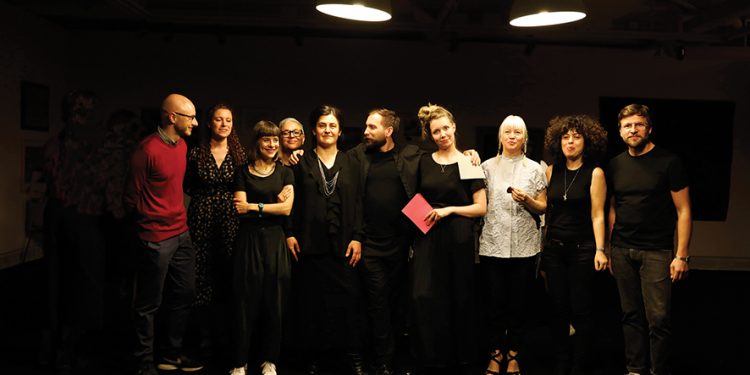Set against the backdrops of Germany’s postwar show business and hit parades, “Ich nehmen dir alles weg – Ein Schlagerballett”, explores the deeply rooted issues of race and identity in a society obsessed with success and image. The play depicts a number of iconic celebrity figures, some instantly recognisable and others less so, their rise to stardom and the compromises that they had to make on the way. From battling racial stereotyping to confronting tokenism, the German entertainment industry is still dominated by this. The struggles of female and gender-fluid characters to balance authenticity and marketability are reminiscent of the experiences of real-life performers who had to “play” the game in order to be successful.
The staging drew a striking parallel from the double meaning “Schlager”, which comes from “schlagen” (hitting or beating up). In English, “hit” is derived from “hitting” and this brought in the metaphor for violence, whether it was hidden or overt, that is an inevitable downside to publicity, celebrity culture, and showbiz. The same obstacles faced performers of color, including immigrants, AfroGermans and foreign entertainers. The nuance of Germany’s evolving relationship to race is revealed, revealing how the popular hit-parades of the postwar period were both a window on mainstream culture and a battleground in terms racial tolerance.
The music, which is a combination Schlager hits with varying popularity levels, is used to explore how racialized body images have been packaged and marketed in German entertainment. This blending of musical styles and languages challenges the sanitized multiculturalism that is often presented onscreen. The juxtaposition of musical styles challenges the audience to confront how diversity is consumed but not always embraced.
Joana Tischkau’s narrative is a tight-knit story that doesn’t shirk from the tough questions: Who defines success in showbusiness? How does Germany’s history influence its current attitudes towards race in the entertainment industry? Can true inclusivity be achieved in a commodified industry? The play exposed the racialization and injustices of showbiz, which are current issues. One could only wish that some repetitive recitatives had not ruined the overall impression. Joana Tischkau founded the German Museum for Black Entertainment & Black Music with Anta Helena, Elisabeth, Hampe, and Frieder Blume. The museum houses a large archive of vinyl records and magazines, autographs, and memorabilia. The museum’s digital tour immerses visitors in a movement which brought together stars who undoubtedly influenced German pop and show business.
The parallels between showbiz and politics are often obvious, despite the fact that the consequences of both are often graver. Sophia Tabatadze is a Georgian-born artist who lives in Berlin and Tbilisi. She is interested in issues of identity, tokenism, and justice, from a female perspective. In her performance developed at the CuratorLab of Konstfack University, Stockholm, Sophia Tabatadze explored the life and works of Alexandra Kolontai. She was a Russian feminist, Marxist theorist, and revolutionary who played an important role in early Soviet Union. The official regime portrayed Alexandra Kolontai as a devoted Communist and a powerful role model of a new emancipated womanhood.
In her performance, “Ask Alexandra,” the actress played the role of Kolontai. She was nicknamed the “Valkyrie of the Revolution” and her involvement and influence in the revolutionary leadership both before and after the Russian Revolution of 1918 were highlighted. Alexandra was subsequently removed from office in 1923 and sent on diplomatic missions.
Tabatadze’s performance, as a female artist, was an attempt to examine the powerplay in the totalitarian Soviet system that, while it boasted of gender equality, feminism, and “equal wages for equal work for all,” regardless of race or gender, actually implemented very few of these loud slogans at the grassroots.
Tabatadze asks two basic questions: How much power did Kolontai have after 1923? And to what extent did Kolontai use her intelligence and charm to ensure her own survival. Sophia wrote, “I had these question and decided to ask Alexandra directly in a performance in which I invited other members from CuratorLab who had focused on Alexandra Kolontai during that study year. We formed a group where I assigned roles to participants and asked them questions they would answer using the Family Constellation Method.
In the Soviet Union, women were not allowed to pursue a career in diplomacy. Women who joined the Communist Party were the only ones who could dream of a career in politics. Women with strong opinions were silenced through political persecutions and repressions. Poet Marina Zvetajewa, and Georgian film-maker Nutza Gogoberidze were just two examples.
Alexandra Kolontai has been lost in obscurity for many women of the former East. But feminist ideas about emancipation, revolution and equality and justice in capitalist societies are just as important today as they were in 1917. How have the priorities of the feminist movement changed over the last century? What relevance do role-models like Alexandra Kolontai hold for us today How can we use past examples to improve our societies? These projects, where contemporary artists identify with activists from the past, might not always provide answers, but they could help us to remember and carry on the legacy of previous generations.
By Lily FurstenowKhositashvili
Read More @ georgiatoday.ge













